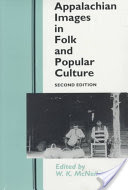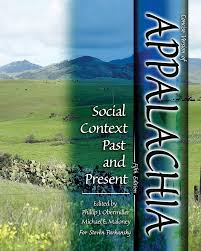In response to Hillbilly Elegy
by Amanda Peach on 2016-09-02T16:54:02-04:00 | 0 CommentsYou only have three days left to check out the book display, "In response to Hillbilly Elegy", that is currently installed near the cafe area on the library's main floor.
The idea for the display grew from an email written by our Sound Archivist, Harry Rice, who had this to say about the controversial title:
J.D. Vance’s recent Hillbilly Elegy has received much negative and positive treatment by the popular press / media (liberal and conservative) and the Appalachian studies community. There is much interest in both what he says and doesn’t say about people in Appalachia. Might a book, media, image, archival collection display ... that portrays contrasting points of view be a good way for the Library to start off the semester?
We couldn't have agreed more, and so currently on display is an array of titles reflecting many different definitions of what it means to be Appalachian, including Hillbilly Elegy itself.
A Reading List in Response to Hillbilly Elegy

Southern Migrants, Northern Exiles by
Call Number: 304.809 B534so Copy 1
Publication Date: 2000
One of the largest internal migrations in U.S. history, the great white migration left its mark on virtually every family in every southern upland and flatland town. In this extraordinary record of ordinary lives, dozens of white southern migrants describe their experiences in the northern "wilderness" and their irradicable attachments to family and community in the South. Southern out-migration drew millions of southern workers to the steel mills, automobile factories, and even agricultural fields and orchards of Ohio, Indiana, Michigan, and Illinois. Through vivid oral histories, Chad Berry explores the conflict between migrants' economic success and their "spiritual exile" in the North. He documents the tension between factory owners who welcomed cheap, naive southern laborers and local "native" workers who greeted migrants with suspicion and hostility. He examines the phenomenon of "shuttle migration," in which migrants came north to work during the winter and returned home to plant spring crops on their southern farms. He also explores the impact of southern traditions--especially the southern evangelical church and "hillbilly" music--brought north by migrants.Berry argues that in spite of being scorned by midwesterners for violence, fecundity, intoxication, laziness, and squalor, the vast majority of southern whites who moved to the Midwest found the economic prosperity they were seeking. By allowing southern migrants to assess their own experiences and tell their own stories, Southern Migrants, Northern Exiles refutes persistent stereotypes about migrants' clannishness, life-style, work ethic, and success in the North.

Publication Date: 1989
Hillbilly Elegy by
Call Number: 305.562 V222h 2016
Publication Date: 2016
From a former marine and Yale Law School graduate, a powerful account of growing up in a poor Rust Belt town that offers a broader, probing look at the struggles of America’s white working class Hillbilly Elegy is a passionate and personal analysis of a culture in crisis—that of white working-class Americans. The decline of this group, a demographic of our country that has been slowly disintegrating over forty years, has been reported on with growing frequency and alarm, but has never before been written about as searingly from the inside. J. D. Vance tells the true story of what a social, regional, and class decline feels like when you were born with it hung around your neck. The Vance family story begins hopefully in postwar America. J. D.’s grandparents were “dirt poor and in love,” and moved north from Kentucky’s Appalachia region to Ohio in the hopes of escaping the dreadful poverty around them. They raised a middle-class family, and eventually their grandchild (the author) would graduate from Yale Law School, a conventional marker of their success in achieving generational upward mobility. But as the family saga of Hillbilly Elegy plays out, we learn that this is only the short, superficial version. Vance’s grandparents, aunt, uncle, sister, and, most of all, his mother, struggled profoundly with the demands of their new middle-class life, and were never able to fully escape the legacy of abuse, alcoholism, poverty, and trauma so characteristic of their part of America.
Add a Comment
Search this Blog
Recent Posts
Remembering and learning about Pope Francis (1936-2025)
April 6 to April 12 2025 is National Library Week. Here are some books about libraries and librarians
Celebrating Women's History Month in 2025
As we close Black History Month for 2025, some more books to read now and year round
A few more books for Black History Month 2025: Biographies
Subscribe
Enter your e-mail address to receive notifications of new posts by e-mail.
Archive
Subjects
Abolitionists /Antislavery Movement
African & African American Studies
African American Music
African Americans
Agriculture & Natural Resources
Appalachian Region
Appalachian Studies
Art & Art History
Arts & Crafts
Asian Studies
Authors / Literature
Awards, Honors, & Recognition
bell hooks
Berea College
Berea College Student Music Performances
Berea Sound Archives
Biographies
Biology
Business Administration
Campus Christian Center
Center for Excellence in Learning through Service (CELTS)
Chemistry
Child & Family Studies
Civil Rights / Race Relations
Dance
Economics
Education / Schools
Education Studies
Educational Technology
English
Environmental Issues
Faculty & Staff
Film Production & Studies
Folklore / Folktales / Storytelling
Foodways / Cookbooks
Forestry
General Studies: GSTR310
Graphic Novels
Health and Human Performance
History
Honorary Degree Recipients
Hutchins Library
Labor Program
Latinx Studies
Librarianship
Mathematics
Music
Music - Appalachian Region
Nursing
Office of the Academic Vice President
Oral Histories and Interviews
Organizations - Local / Regional
Peace & Social Justice Studies
Philosophy
Photograph Collections
Physics
Political Science
Psychology
Public Health / Health Care
Religion
Religious Expression
Social Life and Customs
Sociology
Special Collections & Archives
Spotlight on...
Sustainability & Environmental Studies
Technology & Applied Design
Technology in Education
Theatre
Wellness
Women's & Gender Studies
Zines


0 Comments.